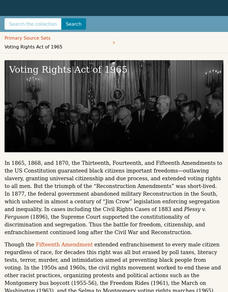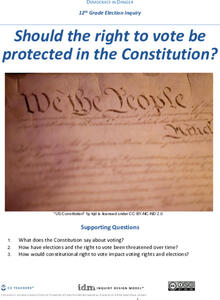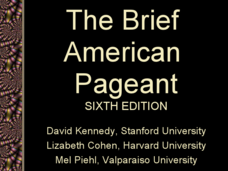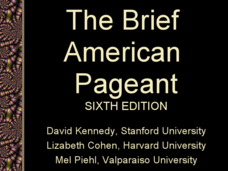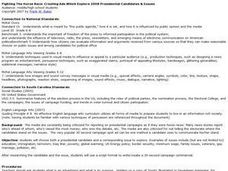The New York Times
Where to Draw the Line: Balancing Government Surveillance with the Fourth Amendment
The question of how to balance Fourth Amendment Rights with national security concerns becomes critical in an age of planned terrorist attacks, election interference, and fake news. Get young social scientists involved in the debate with...
Curated OER
1864-1865: Bringing the War to an End
An interesting lesson plan explains the last battles of the war and the terms of the Articles of Surrender. It also analyzes the election of 1864 with copies of the Baltimore and Chicago platforms. To conclude the lesson, academics...
Digital Public Library of America
Voting Rights Act of 1965
Despite the passing of the Thirteenth, Fourteenth, and Fifteenth Amendments, as well as the passing of the Voting Rights Act of 1965, the struggle to ensure fair voter registration and election procedures continues. Young historians...
Newseum
Disinformation Nation: Separating Politics and Propaganda
Separating political rhetoric from propaganda is no small feat. Class members are challenged to examine two different sources about a candidate in an upcoming election and determine whether the primary purpose of the source is to inform...
C3 Teachers
Democracy in Danger: Should the Right to Vote Be Protected in the Constitution?
High school seniors investigate what national, state and local rules say about voting. After examining the Constitution's articles, clauses, and amendments, researchers look at videos, listen to podcasts, and read articles to gather...
Curated OER
Inform Your Vote
Students examine and participate in the election process, analyze current event topics and offer their opinions. They then share their viewpoints on civic issues. They are encouraged to do additional research on the election's hot issues.
Curated OER
The Brief American Pageant: The Eisenhower Era
Starting with the election results of Eisenhower over Stevenson in 1952, this presentation features additional maps about the elections of 1956 and 1960, with electoral votes by state. Additional slides detail the Far East (Vietnam,...
Curated OER
We the People: A Study in American Voter Turnout: US Government
Learners examine and compare voter turnout in US Elections. They write a letter to a favorite candidate or representative suggesting ways to increase voter turnout.
Curated OER
The Senate
Reinforce your future politicians' growing knowledge about Congress and the Senate with this quiz, which could also be used as a review activity. Questions address the requirements of becoming a senator, as well as the details of Senate...
Curated OER
The Brief American Pageant: Twenty-Three Political Paralysis in the Gilded Age
Detailing the Presidential elections of 1876, 1884, and 1892, this slideshow focuses on the final years of the 19th century in the United States. Additionally, slides include information on the changes in Southern plantations and growth...
Curated OER
The Economics of Voting
Students examine the voting behavior of people during a presidential election to determine costs and the benefits of voting and how this behavior is influenced by incentives.
Curated OER
Young Voters Make A Difference
Students research recent statistics on voting by those 18 to 24. They survey senior students to determine their intent to vote in the next election. Students display the data in charts and graphs. They write the results and share it with...
Curated OER
History of Political Parties in the U. S.
Twelfth graders name some of the parties in the political system of the United States. They identify the two main parties along with key information, issues, events, elections and/or people for each system. They then break into groups...
Curated OER
The Organization of Political Parties
Challenge the future world leaders in your class with this activity, which tests their knowledge on the organization of modern political parties. Students can access their prior knowledge of current elections, or notes from your lecture,...
Curated OER
The Brief American Pageant: Drifting Toward Disunion
A series of maps take viewers through the Antebellum period in American history. Focusing on the elections of Buchanan and Lincoln, as well as the Southern opposition to secession, the slideshow would make a good companion to a lecture...
Curated OER
Political Polls
Students explore politcical polling by conducting a poll of student body elections. They prepare a survey, distribute forms, and tabulate data.
Curated OER
President Bush Balances Power
High schoolers review the results of the November 2006 mid-term election. Using their text, they read the history of the balance of power and examine recent news articles. They present their findings to the class and may even hold a debate.
Curated OER
Fighting The Horse Race: Creating Ads Which Explore 2008 Presidential Candidates & Issues
What is advertising? What role does it plan in an election? Middle and high schoolers discuss advertising and its purpose by sifting through different magazines and discussing the products they find. Then they relate advertisements to...
Curated OER
The Brief American Pageant: The Second War for Independence and the Upsurge of Nationalism
Use this series of bright, informative maps to illustrate important events of America's infancy. Detailing the Missouri Compromise, the Battle of New Orleans, and the Presidential Election of 1812, this presentation would be a good...
Curated OER
The Brief American Pageant: The War to End Wars
While World War I was more of a link of the chain of events in the early 20th century, its historical reputation as "the war to end all wars" has carried through the decades since. This series of slides, though short, shows the major...
Illustrative Mathematics
Voting for Two, Variation 2
John won the election, but by how much more? Your learners will calculate how many votes each candidate received in order to determine the difference. Use with other lessons provided in the series to practice different variations of this...
Illustrative Mathematics
Voting for Two, Variation 4
After elections, the total amount of votes is not specified but the ratio of votes is. Your learners' job is to determine the fraction of votes John received above half of all votes. The problem can be solved abstractly or by other...
Illustrative Mathematics
Voting for Two, Variation 3
After calculating election votes, your learners must determine how many votes the winner, John, got above 50%. This multi-step problem encourages them to think in a deeper way about what the question is asking them to find. Use with...
Curated OER
Hail to the Chief
Pupils explore how the New York Times has represented presidential victories on its front page throughout the 20th century.
Other popular searches
- Election Day
- Presidential Elections
- Election Day for Kids
- 2008 Presidential Election
- Voting and Elections
- Election of 1860
- Election 2008
- 2nd Grade Election Day
- Mock Election
- Election Day Activities K 3
- Abraham Lincoln Election
- 2008 Elections




